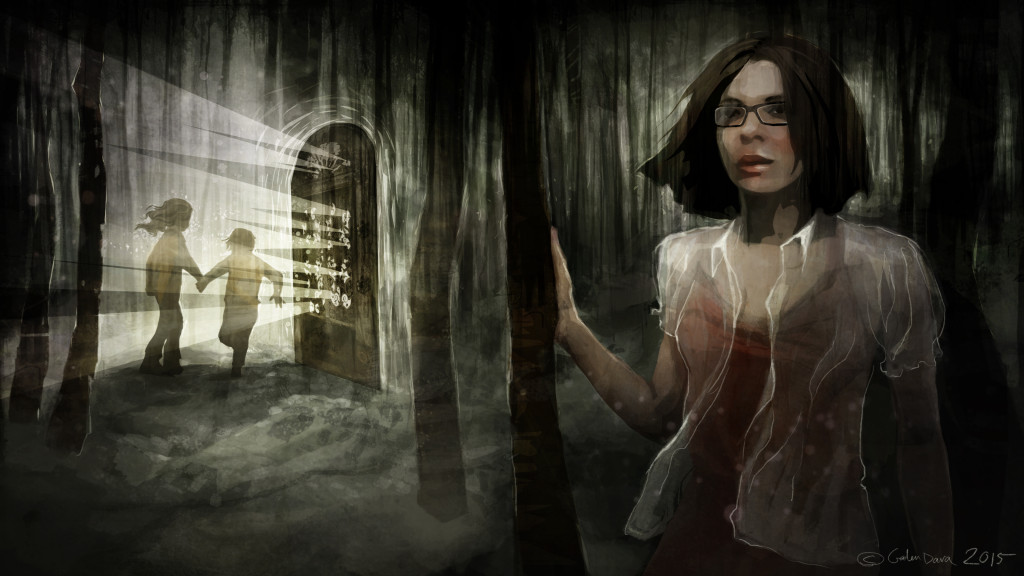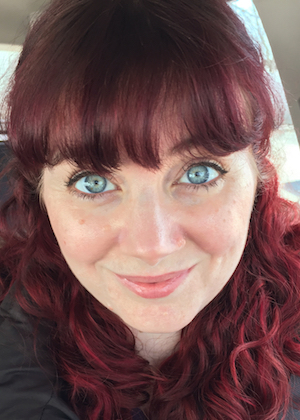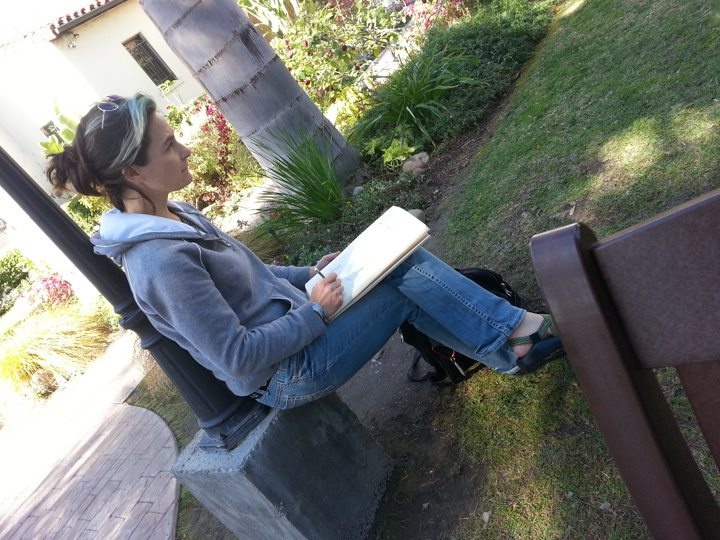Children of Rouwen
by Andrea Phillips
Illustrated by Galen Dara | Edited by Brian J. White
May 2015
The new house was too small for the three of them, really. Even so, it was more than she could strictly afford.
Laura stared at the curling shingles, the algae-dusted vinyl siding, the cracked and pitted sidewalk leading up to the door. Two withered collections of sticks that used to be shrubs squatted on either side of the front steps, and the expanse of front lawn was on the side of patchy and desiccated.
It was out in the country, at least. Fresh air was good for children, wasn’t it? And proximity to nature?
She pulled up the parking brake a little harder than it needed and mustered a smile. “So this is our new house!” she told her children. Molly smiled back, but it was a polite smile, not a happy one. David didn’t smile at all.
They clambered out of the car and spent a quiet moment in shared contemplation of their new circumstances. “Can we go play?” David asked. His eyes were pinched and sad from seeing too much truth.
Laura hesitated. Back home in the city she wouldn’t have allowed it, but maybe a little taste of freedom would help the children make peace with where they’d landed. “Just don’t go too far, and — there’s supposed to be a creek back there. Stay away from it, OK?”
The two raced through the dry weeds, around the house and straight on toward the mysteries that lay beyond. For a moment they looked like children again, light of heart and full of play.
Maybe, Laura thought, it would all be all right. She pulled a box of dishes from the trunk. Maybe they would weather the move and the divorce and the money problems, rise above it all and live rich lives full of love and meaning. She pressed away the hot prickle at the inside corners of her eyes, then hefted the box a little higher and went in to the dismal and ill-lit kitchen to try to force this new life into a shape resembling happiness.
The children returned from their expedition a few hours later, giggling and filthy. Laura smiled at the sound. It was a welcome break from the bleak silence of a house that hasn’t been lived in. “Where did you go?”
“We were just looking around,” Molly said. She drew a vague symbol in the air.
“Did you make any friends?”
“Sort of,” David said, at the same time that Molly said, “No.”
They exchanged a sidelong glance. “There were some animals,” Molly said.
Laura frowned. “Be careful, you never know what might bite you.”
“We know.” Molly heaved a hyperbolic sigh.
Laura rested a hand on David’s downy head. His hair was full of broken bits of leaves. “The bathroom is straight back there. Go wash up,” she told them. “I’ll have dinner ready soon.”
The children clomped away obediently, leaving behind a trail of muddy footprints. The mud was rich and black and filled the house with the scent of secret things growing toward the light.
Mud?
Laura thought about the dry, dead grass and the shrubs. “Did you find the creek?” she called.
“We did but it’s all dried up,” Molly’s voice echoed across layers of bare drywall and linoleum. When she started water in the bathtub, the pipes in the walls squealed in horror at being pressed into this unaccustomed duty.
“Then where—” Laura stopped herself. First impressions, she thought. Positive experiences. They’d come home safely, right? So there was nothing to be gained from grilling them about where a little mud came from. Let it go, let it go, let them have their day of wonder.
That night they all slept in a tangle of blankets and pillows on the floor. The children snuggled on either side of her.
“Tell us a bedtime story,” Molly demanded.
“What about?”
“Fairies and unicorns.”
“And a magical kingdom,” David said, dreamy.
“Once upon a time, there was a fairy called Polly—”
Molly poked her. “No, her name is Peaseblossom.”
“Peaseblossom? Where did you come up with that name?”
“It’s from Shakespeare.” David delivered his fact with a careful and self-important enunciation.
“I know that.” Laura scuffed his hair. “But how do you know that?”
“Reading,” Molly said loftily.
“All right, once there was a fairy called Peaseblossom, who lived in a magical kingdom called—”
“Rouwen.” David breathed it like the word was a prayer, or an invocation.
“What a funny word.”
“He made it up,” Molly announced. She sat up and hit her brother with a pillow.
“Hey! I didn’t—”
“No fighting.” Laura pried the pillow out of Molly’s hands. “So — what was it? Row—”
“Rouwen.” Molly’s eyes shone in the dark. “It’s a beautiful place with green, green grass, and trees of gold and silver, and—”
“And a city with towers as high as the moon, and brave warriors in shining armor who… who…”
“Who fight to protect the weak and keep the ancient evil away!”
Laura blinked at this unprecedented flurry of imagination. “It sounds like you should be the ones telling the bedtime story to me tonight.”
David yawned and curled in closer to Laura’s shoulder. “I’m tired. We should just go to sleep.”
Molly flopped onto her back. “I guess.”
“Good night, bunnies.” Laura kissed them each on the tops of their heads. “Sweet dreams.”
The children dozed off before long, a testament to the miracle of exercise outdoors. But Laura stayed up well into the night, staring into the darkness and working the same equation over and over, hoping she could find a way to make the numbers add up to enough. They never did.
The summer was hot and bright. Laura spent her days scouring job listings, or posting her resume, or looking for a place to say something insightful that might come to the attention of someone who could hire her. Or she tried, anyhow — half her time was spent on the phone with some technician or other, trying to persuade them that her home really did exist, and that she was in fact a customer, but that her service was nonetheless not functioning as reliably it should.
That equation was never far from her mind, the one balancing income and food and rent and the looming need for childcare in the event that her search paid off.
The children, at least, seemed to be content. They spent their days roaming free like feral cats. They would vanish the whole day, turning up only to pick at the meals she made. Their skin darkened, their hair lightened, their limbs grew stronger.
At first they chattered to her about Rouwen, their shared imaginary world full of talking animals, wizardry, and noblesse oblige. But as the weeks passed, they spent less and less time describing their daily adventures. They spent less and less time speaking to her at all, in fact; they left earlier and returned later with every passing day.
Laura was afraid to look too closely at this brittle contentment. Her attention might dissolve the glue that bound it together. But at least — at least they weren’t grieving for what they had lost. That had to be worth something.
So she held onto her questions, planting them deep under her mountain of heavier concerns. But one sprouted and blossomed in early August, when the children loped back at dusk after another of their endless expeditions. The air was heavy; Molly had rolled her shorts up and David had his shirt slung over one shoulder. As they grew closer, a new detail became clear: David had an angry red line across his ribs. A scar, straight and clean as if it had been painted.
“David Wohlreich, where did you get that?” Laura asked sharply. “And why didn’t you tell me you were hurt?”
David ducked back into his shirt. “It was just a — a scratch. From climbing a tree.”
Laura pressed her fingers to her lips, visions of a thousand broken bones haunting her. What if he’d broken his neck? And out here, how long would it take for an ambulance to come? “Obviously you were doing something dangerous and you should’ve known better,” she said. “I— I think I can’t let you run around like this anymore. You need better supervision.”
“What?” David flinched back from this betrayal.
“From now on you have to stay close to home. No leaving the property — if I can’t see you from the house, you’re in trouble.”
“But you can’t!” Molly stomped a foot. “It’s— it’s too important, we have to get back to…” She shared a long and meaningful look with her brother. “We just have to.”
“No more.” Laura shepherded them inside.
The pair simmered at the edge of rebellion that night but never quite spilled over. The next day they huddled together at the edge of the yard, talking in low voices. Molly scraped at the dust with a stick. David plucked the dead leaves off a shrub and shredded them. They ate dinner in sullen silence, refusing to even look at their mother.
The day after they went a little further afield, just at the limit of the rule she’d made. The next day, they slipped away when she wasn’t looking; the rounds of searching, submitting, following up kept her bent over her keyboard. By the time she noticed, it might’ve been minutes or hours that they’d been gone.
When they returned again, mud-covered, straight-backed, and silent, she chose to say nothing.
Near the end of August, Laura got the call she’d been desperately afraid would never come. She hung up the phone with her heart racing, palms tingling.
It was over, it was going to be all right.
The salary Laura had been offered was generous; life-saving, even. It would bring them out of this ramshackle house in the middle of nowhere and bring her family safely back into the trajectory she’d always expected. Full bellies and soft beds. Good schools and a college fund. Afternoons at the movies. Even vacations, maybe. The future lay before her in a rosy fullness of hope.
She walked outside. “Molly, David!” she called them. “Come home, I have wonderful news!”
They didn’t hear her. Too far, she thought. Where did they go, anyway? She’d let them loose for too long — it was for the best the call had come when it did.
The pair didn’t come home again until dinner was cold — a roasted chicken and mashed potatoes to celebrate their return to their real lives, the lives they were meant for. Laura gave them a brilliant smile. “So I had an exciting day.”
Molly mumbled something by way of polite interest. David stuffed a spoonful of peas into his maw.
“I finally got a job!” Laura crowed. “We’re going to move back into the city before the school year starts. I’ve already got a broker looking for—”
“What?” Molly was incredulous. “We can’t go back! We have to stay here!”
“Listen, I know it’s been a hard time for you, but it’s going to be just like it was before — better. We’ll all have our own rooms again, and parks with real playgrounds—”
“No.” David growled. “We can’t go!”
Laura’s jaw tensed. “We have to do it, honey. There’s nothing else I can do.”
Across the table from her, David scowled and crossed his arms. “We’re not going.”
“Come on,” Laura pleaded. “Don’t be like that. It’s not like there’s anything here for us.”
“There’s Rouwen.” Molly help her chin high with defiance.
“Your pretend game? What does that have to do with—”
David’s voice was full of anguish. “They need us.”
“What are you talking about? Listen — it doesn’t matter. This is what we have to do, and there’s no use in arguing about it.”
“No,” Molly screamed. She stood, her seat clattering to the floor behind her. “You can’t take us away from Rouwen. If you try, we’ll run away there, and we won’t ever come back. Not for a hundred years. Not for a hundred, hundred years!”
And then she fled away to the back of the house, David close behind. Laura chased them through the field of dead weeds, past the oak tree and down the slope.
There was a cement-lined ditch at the bottom. She slid down into it and scraped her knee. By the time she crawled cursing up the other side, the children had vanished into the scrubby woods that waited there.
But there was a trail; that had to be where they’d gone. She limped along after them in the twilight. Fog had pooled in the low places in the ground. Laura stumbled over roots and hollows at every other step.
Up ahead, there was light. A gate of curved wrought iron sat in the middle of the path, going nowhere and leading nowhere; there were no walls on either side. Sunlight streamed through it, melting away the curls of mist in its lap.
She stepped closer.
There — there was the green, green grass, and the forest glinting with leaves of gold and silver. And in the distance a city, all spires shining like glass in pink and blue and green. It was Rouwen. It was… real.
She put a hand on the gate, but the chain was padlocked tight. She rattled it anyway. The bars were just wide enough for a child to slip through.
She wondered if they would ever come back.
They returned at dawn to find their mother curled up against the gate, red-eyed and waiting. Molly folded Laura’s hand in her own, hands that were small but were no longer a child’s. “I’m sorry,” she said.
“Me too.” David stroked his mother’s hair.
A chill ran down Laura’s spine. “You decided you can’t live a hundred years in Rouwen after all?”
“No,” Molly said, with a small, sad smile. It spoke of battles won and lost, triumph and sorrow deeper than oceans. “We did.”


